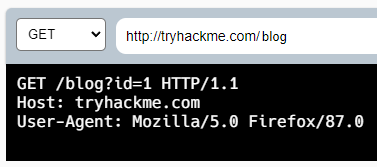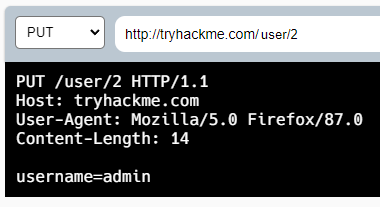
#
Web Fundamentals
Learn about how you request content from a web server using the HTTP protocol. This is a very easy room explaining how the world wide web works. Check the video from TryHackMe for a very detailed walkthrough.
#
Writeup
#
Task 1: What is HTTP(S)?
What does HTTP stand for?
HyperText Transfer Protocol
What does the S in HTTPS stand for?
Secure
On the mock webpage on the right there is an issue, once you've found it, click on it. What is the challenge flag?
Click on the lock to examine the SSL certificate. It will pop-up the first flag.

THM{INVALID_HTTP_CERT}
#
Task 2: Requests And Responses
What HTTP protocol is being used in the above example?
HTTP/1.1
What response header tells the browser how much data to expect?
Content-Length
#
Task 3: HTTP Methods
What method would be used to create a new user account?
POST
What method would be used to update your email address?
PUT
What method would be used to remove a picture you've uploaded to your account?
DELETE
What method would be used to view a news article?
GET
#
Task 4: HTTP Status Codes
What response code might you receive if you've created a new user or blog post article?
201
What response code might you receive if you've tried to access a page that doesn't exist?
404
What response code might you receive if the web server cannot access its database and the application crashes?
503
What response code might you receive if you try to edit your profile without logging in first?
401
#
Task 5: Headers
What header tells the web server what browser is being used?
User-Agent
What header tells the browser what type of data is being returned?
Content-Type
What header tells the web server which website is being requested?
Host
#
Task 6: Cookies
Which header is used to save cookies to your computer?
Set-Cookie
#
Task 7: Making Requests
Make a GET request to /room
Change the method to GET and the URL to /room. Flag will be displayed in the response.

THM{YOU'RE_IN_THE_ROOM}
Make a GET request to /blog and using the gear icon set the id parameter to 1 in the URL field
Change the method to GET and the URL to /blog. Change the parameter id to 1. Flag will be displayed in the response.

THM{YOU_FOUND_THE_BLOG}
Make a DELETE request to /user/1
Change the method to DELETE and the URL to /user/1. Flag will be displayed in the response.

THM{USER_IS_DELETED}
Make a PUT request to /user/2 with the username parameter set to admin
Change the method to PUT and the URL to /user/2. Change the parameter username to admin. Flag will be displayed in the response.

THM{USER_HAS_UPDATED}
POST the username of thm and a password of letmein to /login
Change the method to POST and the URL to /login. Change the parameter username to thm, and the parameter password to letmein. Flag will be displayed in the response.

THM{HTTP_REQUEST_MASTER}
Congratiulations, you've completed the room.